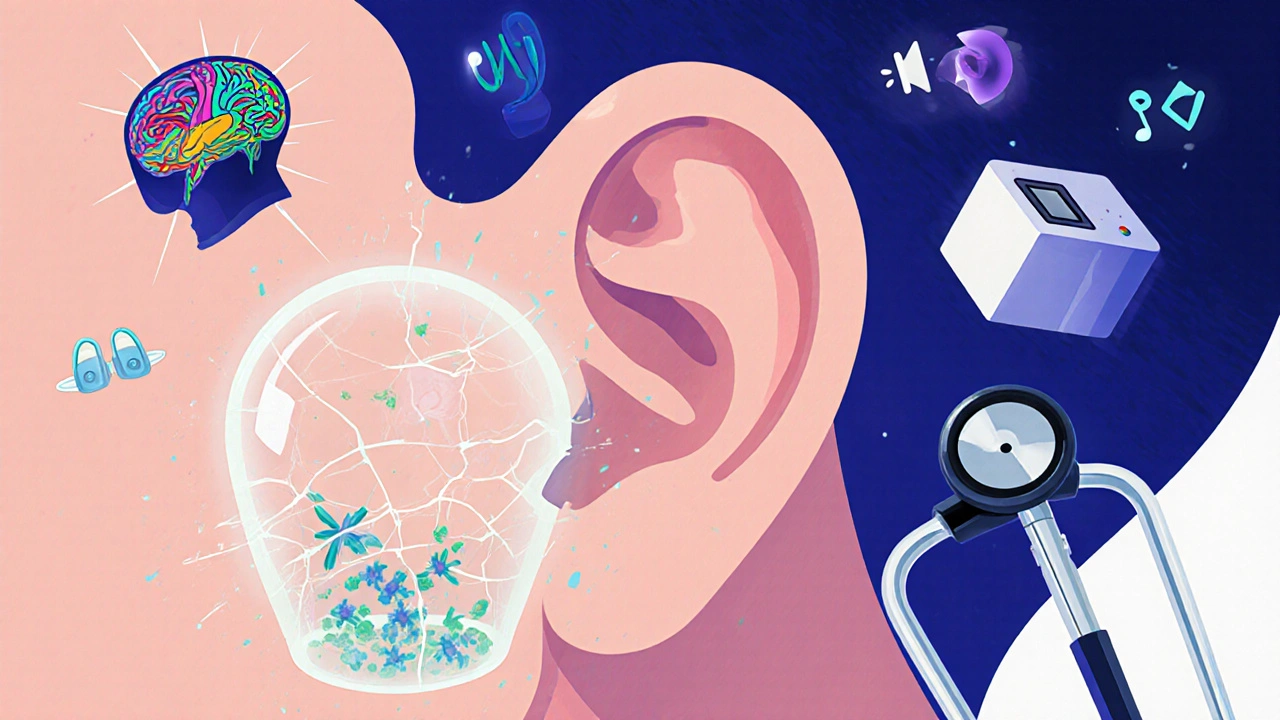Most people don’t realize how common tinnitus is-until they hear it themselves. That high-pitched ringing, buzzing, or hissing in the ears when there’s no external sound? It’s not just in your head-it’s a real, measurable condition affecting 1 in 5 people worldwide. For some, it’s a brief annoyance. For others, it’s a constant, exhausting presence that steals sleep, focus, and peace of mind. The good news? You’re not alone, and there are real, science-backed ways to manage it-even if there’s no magic cure.
What Exactly Is Tinnitus?
Tinnitus isn’t a disease. It’s a symptom. Your brain is hearing something that isn’t there. The sound isn’t coming from your ears-it’s being generated in the auditory cortex, the part of your brain that processes sound. When the signals from your inner ear get damaged or disrupted, your brain tries to fill in the gaps. That’s when the ringing starts. There are two main types:- Subjective tinnitus (99% of cases): Only you can hear it. This is what most people experience-ringing, buzzing, or roaring with no source.
- Objective tinnitus (1% of cases): A doctor can actually hear it during an exam. This often comes from blood vessel issues, like turbulent blood flow near the ear, and can sound like a pulsing or thumping that matches your heartbeat.
The sounds vary. Half of people describe it as ringing. A fifth say buzzing. Others hear hissing, roaring, or clicking. It can be in one ear or both. For some, it lasts seconds. For others, it’s been there for years.
Why Does It Happen? The Real Causes
Most people assume tinnitus means something’s wrong with their ears. It’s often true-but not always. Here’s what actually causes it:- Hearing loss (80% of cases): This is the biggest cause. When the tiny hair cells in your inner ear get damaged-from noise, aging, or illness-they send chaotic signals to your brain. Your brain interprets that noise as ringing. Age-related hearing loss (presbycusis) affects 30% of people 65-74, and 85% of them also have tinnitus.
- Noise exposure (15%): Working in loud environments, listening to music through headphones at high volumes, or even attending concerts without protection can cause permanent damage. You don’t need to be at a rock concert-85 decibels (like heavy city traffic) over long periods is enough.
- Earwax blockage (10-15%): A simple buildup of wax can press against your eardrum and trigger tinnitus. It’s one of the easiest fixes: professional removal often clears it up in under 48 hours.
- Medications (5%): Over 200 drugs can cause or worsen tinnitus. Common ones include high doses of aspirin (more than 4 grams a day), certain antibiotics like gentamicin, diuretics like furosemide, and some antidepressants. If you started a new medication and the ringing began, talk to your doctor. Stopping it often helps-70% of cases improve within weeks.
- Pulsatile tinnitus (4% of all cases): This isn’t just noise-it’s your blood. Causes include atherosclerosis (plaque in arteries), rare tumors like glomus tumors, or high pressure inside the skull. If you hear a rhythmic thump in time with your heartbeat, you need imaging-an MRI is usually the first step.
- Other triggers: Middle ear infections, head or neck injuries, and even stress can make tinnitus worse.
How Is It Diagnosed?
If you’re hearing phantom sounds, your doctor won’t just guess. Here’s how they find out what’s going on:- Physical exam: They’ll check your ears for wax, infection, or blockages. If you have pulsatile tinnitus, they’ll listen near your neck and ears for abnormal blood flow.
- Hearing test: A pure-tone audiogram is standard. Around 80% of people with tinnitus show some degree of hearing loss-even if they don’t notice it yet.
- Questionnaires: The Tinnitus Handicap Inventory (THI) rates your symptoms on a scale from 0 to 100. A score of 18-36 means mild impact. 58-76? Severe. 78-100? Catastrophic. This helps track progress.
- Imaging: If your tinnitus pulses with your heartbeat, you’ll likely get an MRI with contrast. It’s 95% accurate at spotting vascular problems. CT angiography follows if needed.
Don’t skip the hearing test. Many people assume their tinnitus is just stress. But if you have hearing loss, treating it can reduce the ringing significantly.

What Actually Works to Manage It?
There’s no pill that erases tinnitus. But there are proven ways to make it less intrusive. The goal isn’t to make it disappear-it’s to make it something your brain learns to ignore.1. Hearing Aids
If you have hearing loss, hearing aids are the single most effective tool for many. They don’t just amplify sound-they flood your brain with real noise, which reduces the brain’s need to create phantom sounds. About 60% of people with hearing loss and tinnitus report major improvement. Modern hearing aids even have built-in sound therapy features-gentle white noise or nature sounds that play automatically.2. Sound Therapy
Your brain can’t ignore silence. That’s why tinnitus feels louder at night. Sound therapy uses background noise to mask the ringing. It doesn’t hide it completely-it just makes it less noticeable.- White noise machines
- Smartphone apps (like myNoise, SoundCure, or even YouTube playlists)
- Fan noise, aquariums, or rain sounds
Studies show 40-50% of users get relief. Reddit’s tinnitus community (65,000+ members) says sound masking is the #1 go-to strategy. Try it for 2-4 weeks. Use it while sleeping, working, or relaxing.
3. Cognitive Behavioral Therapy (CBT)
This isn’t just “think positive.” CBT is a structured 8-12 week program that teaches you how your thoughts and reactions amplify tinnitus distress. It helps rewire how your brain responds to the sound.Research shows CBT reduces emotional suffering in 50-60% of people. It doesn’t silence the ringing-but it stops it from controlling your life. If you’re anxious, struggling to sleep, or avoiding social events because of tinnitus, CBT is one of the most powerful tools you can use.
4. Address the Root Cause
Sometimes, fixing the problem stops the ringing:- Remove impacted earwax → 85% improvement within two days
- Stop ototoxic meds → 70% see improvement in weeks
- Treat high blood pressure or atherosclerosis → can reduce pulsatile tinnitus
Don’t ignore this step. A simple ear cleaning or a medication switch can be life-changing.
5. Emerging Treatments
New tech is making waves:- Lenire device: FDA-approved in 2022. It delivers sound through headphones and mild tongue stimulation at the same time. In a 2020 trial, 80% of users had lasting improvement for over a year.
- Oasis device: FDA-approved in 2023. Uses personalized sound therapy. 65% reported significant relief.
- Transcranial magnetic stimulation (TMS): Non-invasive brain stimulation. Still experimental, but shows 30-40% effectiveness in trials.
These aren’t available everywhere yet-but they’re real options for people who haven’t found relief elsewhere.
What Doesn’t Work (And What to Avoid)
There’s a lot of noise out there about tinnitus cures:- Herbal supplements (ginkgo biloba, zinc, melatonin): No strong evidence they help. Some can interact with meds.
- Ear candling: Dangerous. Can burn your ear or push wax deeper.
- “Cure” devices sold online: If it promises to eliminate tinnitus in days, it’s a scam. There’s no FDA-approved cure yet.
- Isolating yourself: Avoiding social situations because of tinnitus makes anxiety worse. Stay connected.
Stick to science-backed methods. Your brain adapts-but only if you give it the right signals.

How Long Does It Last?
The good news? Most new cases get better on their own. About 80% of people notice significant improvement within 6-12 months, even without treatment. Your brain learns to filter out the noise. That’s called neural adaptation.But 20% develop chronic tinnitus. That doesn’t mean it’s hopeless. It just means you need a long-term management plan-not a cure.
Living With It: Daily Tips
You can still live well with tinnitus:- Protect your hearing: Use earplugs in loud places. Keep headphone volume below 60%.
- Reduce stress: Anxiety makes tinnitus louder. Try walking, yoga, or breathing exercises.
- Sleep better: Use sound therapy at night. Avoid caffeine after 2 PM.
- Stay active: Social engagement and physical activity reduce the emotional burden.
- Track your triggers: Do loud events, stress, or certain foods make it worse? Keep a simple journal.
It’s not about eliminating the sound. It’s about reclaiming your life despite it.
When to See a Doctor
See a specialist if:- The ringing is only in one ear
- It’s pulsing with your heartbeat
- You have sudden hearing loss
- It’s accompanied by dizziness or balance problems
- It’s making you anxious, depressed, or unable to sleep
Don’t wait. Early intervention means better outcomes.



I’ve had tinnitus for 7 years now and honestly? The biggest help was just accepting it’s not going away. Not giving it power. I started using a fan at night and it’s like my brain finally stopped screaming back.
It’s not gone, but it’s just… background noise now. Like the fridge humming. I don’t even notice it unless I’m trying to.
Stop fighting it. Let it be there. That’s when the peace comes.
Oh for fucks sake, another ‘tinnitus is just stress’ blog post. Look, I’ve got a PhD in auditory neuroscience and let me tell you-most of this is just lazy, oversimplified pop-science dressed up like a medical journal.
CBT? Sure, if you’re a middle-class American with access to $150/hour therapists. What about the guy working night shifts in a factory with no insurance? The ‘60% improvement’ stat? That’s from a trial with 37 people who got free noise machines.
And don’t get me started on Lenire. It’s basically a fancy placebo with a $3,000 price tag and a marketing team that watched too many Apple ads.
Real talk? If you’re not deaf, you’re not ‘tinnitus affected’-you’re just annoyed. Go drink less coffee and stop Googling it at 3 AM.
Interesting read, and I appreciate the breakdown, but I think one thing that’s often missing from these discussions is the psychological toll of living with tinnitus long-term. It’s not just about the sound-it’s the dread that comes with every quiet moment, the way you start avoiding restaurants because the clatter makes it worse, the guilt you feel when you snap at your partner because you can’t concentrate.
I’ve tried everything: hearing aids, white noise, mindfulness apps, even acupuncture. The only thing that gave me any real traction was a combination of sound therapy and seeing a therapist who actually understood chronic sensory conditions-not just ‘try to relax.’
And yeah, the meds thing is huge. I was on sertraline for anxiety and didn’t realize it was making my tinnitus 3x louder until I switched. Took three months for it to settle down. Never would’ve known if I hadn’t dug into the side effect list.
Bottom line: it’s not a one-size-fits-all. What works for one person is noise to another. But at least now we’re talking about it more than just whispering in the dark.
My dad had tinnitus after 30 years in construction. He refused hearing aids for years-said they made it worse. Then he got one with a built-in sound generator and now he says it’s like having a little radio in his head playing ocean waves.
He still hears the ringing, but it doesn’t bother him anymore. That’s the trick, isn’t it? Not silence. Just… different noise.
Also, earwax. Holy hell. I had mine cleaned last year and the ringing dropped 70% overnight. I thought I was going deaf. Turns out I just had a cave in there.
There’s a critical distinction here that’s often conflated: tinnitus as a sensory phenomenon versus tinnitus as a perceptual distress response. The auditory cortex’s compensatory hyperactivity following deafferentation is well-documented in neuroimaging studies, particularly in the dorsolateral prefrontal and anterior cingulate regions.
What CBT achieves isn’t ‘rewiring’ in the pop-neuro sense-it’s modulating the limbic system’s emotional valuation of the signal. The sound remains unchanged, but its salience is reduced through top-down cognitive reappraisal.
Similarly, sound therapy doesn’t mask; it provides competing input that reduces neural gain in the auditory pathway. This is why broadband noise is more effective than music-music has semantic content that activates memory networks, potentially reinforcing attention to the tinnitus.
It’s not magic. It’s neuroplasticity. And yes, the 80% spontaneous improvement rate aligns with longitudinal studies from the 1990s-neural adaptation is real, but it’s slow and non-linear. Patience isn’t passive-it’s neurobiological.
LOL at all these people acting like they’ve cracked the code on tinnitus. You think your ‘sound therapy’ is gonna fix it? You’re just drowning out the symptom like a kid covering their ears during a lecture.
And CBT? That’s just telling people to ‘think differently’ while the medical system ignores the real issue: we’ve been overprescribing ototoxic meds for decades and now we’re selling $3k gadgets to fix the mess.
Also-ginkgo biloba doesn’t work? Says who? The FDA? The same people who approved OxyContin? You trust institutions? Bro.
And don’t get me started on ‘hearing aids help.’ If you’re 70 and deaf, sure. But if you’re 32 and got tinnitus from blasting rap at 90% volume? You don’t need a hearing aid-you need to stop being an idiot.
Stop wasting money. Stop believing in tech. Just shut the fuck up and live with it. That’s the only cure.
I tried every supplement and now I just play lofi beats on loop and pretend I’m in a cafe in Tokyo